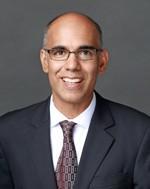Dr. Sharif Nankoe has been appointed as Medical Director for Spectrum Health Systems’ new statewide correctional program with the Massachusetts Department of Corrections (MADOC), serving inmates with opioid use disorders (OUD). Get to know Dr. Nankoe and his views on correctional addiction treatment!
What brought you to Spectrum Health Systems?
I have been connected to Spectrum’s Chief Medical Officer Dr. Jeff Baxter for a long time. When I was a resident-physician at UMass, he became my mentor in addiction medicine and we have kept in touch over the years. I feel very fortunate to work with him again.
My specialty is addiction medicine with a focus on treating opioid use disorder in incarcerated populations, and when Spectrum was awarded this groundbreaking contract with the MADOC, it was an easy decision to work with my mentor and with this amazing organization. I have always held Spectrum in such high regard; their treatment of persons with substance use disorders (SUD) in the community is exemplary, and the quality of their programs in jails and prisons is no different.
Why did you decide to specialize in addiction medicine?
I grew up in a family in which we regularly discussed social issues around the dinner table, and as a result I have always felt drawn to working with underserved populations. Persons with SUDs are often ostracized and neglected by society and serving this population has resonated with me both professionally and intellectually. Over the past 20 years, the movement to treat addiction in our communities has grown and we are seeing many states aiming to provide better care for individuals with OUD, not only by providing naloxone to treat an opioid overdose, but also by expanding access to treatment with buprenorphine-naloxone and methadone. It has been extremely satisfying to be part of this movement.
What made you want to devote your time to addiction treatment in corrections?
While I was a medical director of an opioid treatment program (OTP) in Vermont, I was invited to help set up a medication for opioid use disorder (MOUD) program for all six Vermont state prisons. Ultimately, I was asked to assume leadership of these programs, and I have remained involved in treating incarcerated patients with OUD ever since.
Jails and prisons are in critical need of treatment for OUD. Nearly two-thirds of inmates have a substance use disorder according to recent studies – much higher rates than in the community where about one in 10 persons have an SUD. Incarcerated patients with OUD are among the most complicated, often in poor health, with high rates of mental illness and chronic medical conditions, and significant risk factors for adverse outcomes. Their risk of death from overdose after release is 120 times higher than individuals living in the community without periods of recent incarceration. Imprisoned individuals with OUD also have higher rates of rearrest and reincarceration after release.
Providing addiction treatment in corrections makes sense from a public health perspective; it provides benefits for incarcerated patients, their families, and the community, while reducing costs to society. It is for all these reasons that I have devoted my energies here.
What does your role as Medical Director for Spectrum’s statewide contract entail?
As Medical Director I provide oversight, direction, and implementation of medical operations for Spectrum’s DOC Programs. I provide patient care, including treatment with methadone, buprenorphine, and naltrexone. I also educate stakeholders about OUD as a chronic brain disease, evaluate the challenges of providing treatment in correctional settings, and work in partnership with our talented leadership team to develop strategies to overcome these barriers.
What does success in this role look like to you?
Success means that we set up a robust program that assesses, treats, and ultimately stabilizes incarcerated patients with opioid use disorder. The severity of OUD among incarcerated individuals is so significant that it is often the primary cause of their crimes and subsequent incarceration. The correctional system should be thought of as society’s intensive care unit for individuals with severe substance use disorders and mental illness. Therefore, for us to be successful, these patients must receive the best medical treatment and programming available for OUD – care that is well-designed, comprehensive, patient-centered, and that genuinely sets patients up to be successful for the remainder of their incarceration and in the community after release. Success also means the program delivers care that is consistent with the prevailing medical standards in the community and guided by the best medical evidence. I am so proud to be part of an organization with such a strong, experienced leadership team, and I have no doubt that we will succeed.
What is most challenging about this work? The most rewarding?
Providing MOUD in corrections is innovative work. Many people in our society still view OUD as a character flaw or a moral failure that should only be addressed with punishment. We are working hard to shift these perceptions and to see OUD as a chronic brain disease for which there are well-established treatments.
It is inspiring and rewarding to work with our impressive team of nurses, clinicians, recovery support navigators, and medical providers. Our talented team has gone above and beyond to care for these high-acuity patients and ensure a smooth transition into the community after release.
Tell us more about your life outside of Spectrum. Do you have any hobbies?
In my free time I love spending time outdoors – skiing, biking, hiking. I also love to travel and cook. I’m a huge fan of music, especially when it has a positive, uplifting message!
Dr. Nankoe’s passion for this work is making a huge difference in providing addiction treatment in correctional facilities, and we’re thrilled to have him leading the charge with our new contract in Massachusetts.
For more information about Spectrum’s correctional treatment programs, visit https://spectrumcorrections.org. For current job openings at Spectrum, visit our careers page at https://spectrumhealthsystems.org.



